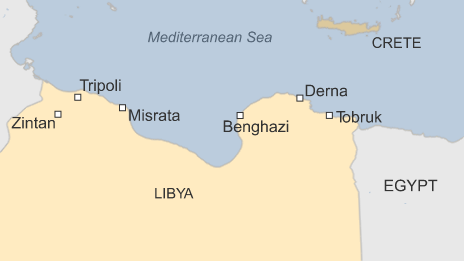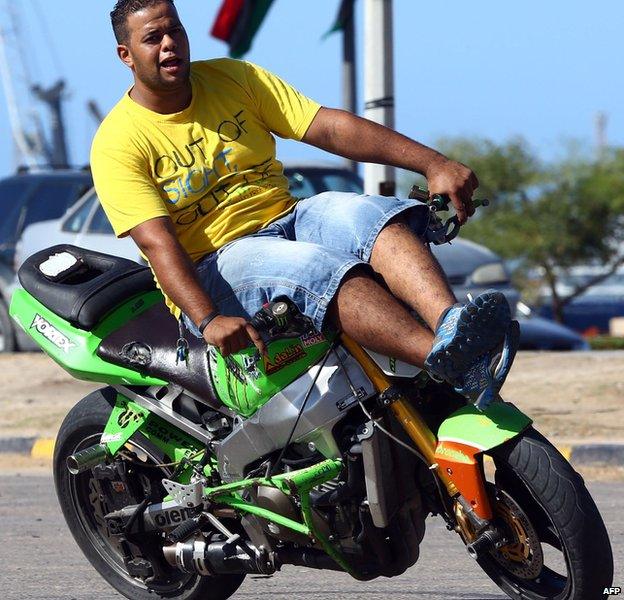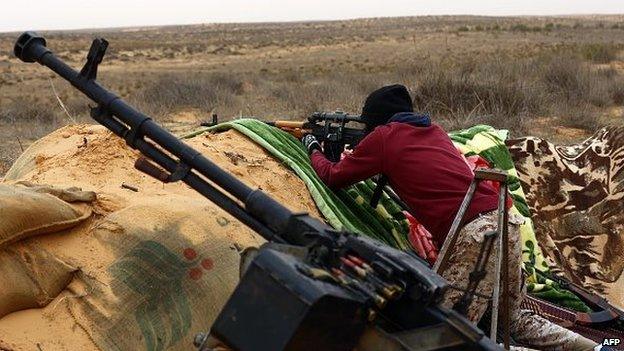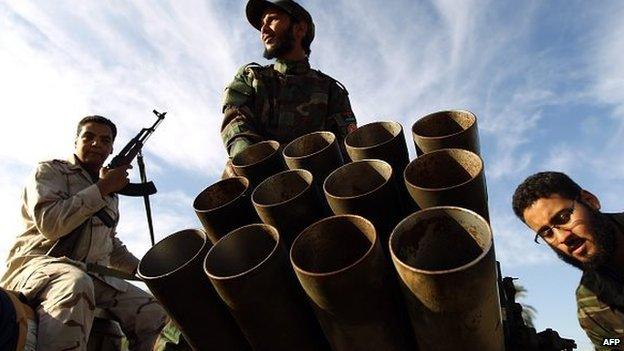Fighting for the spoils of Libya's revolution
- Published
The BBC's Ian Pannell travelled to Libya's capital to discover a country now in the hands of militias
"Libya is open, Libya is safe". With a fixed grin revealing a tightly clenched set of teeth, Jamal Zubia welcomed us to Tripoli.
The head of the foreign media department beamed reassuringly: "We urge investors to come back. We believe in transparency, truth and professionalism - we're ready to answer all questions."
We had been invited to watch the graduation of a new cohort of spin-doctors for the self-proclaimed government in Tripoli. Not the most scintillating of occasions but one designed to send a message of business as usual.
If the ruling coalition in the west of the country is to be believed, all is well in the new Libyan state.
Over a lunch of chicken and rice one of the graduates introduced herself.
Sabah Abul-Ez had been living in exile with her family in Manchester in England but she moved back to help rebuild the country after the overthrow of Colonel Muammar Gaddafi.
For more than two years the country prospered but the hopes and dreams of those who joined the revolution have gone awry.
Ms Abul-Ez has still to learn the alchemy of spin doctoring.
She told me she is thinking of returning to Manchester with her child because of the state of the country. Her husband wants to stay.
"If he doesn't want to go back, I'll divorce him," she said. I think she was joking.
Restaurants packed
The last time I was in Libya was towards the end of the war which resulted in Gaddafi's downfall.
The picture seemed clear then.
What used to be called The Arab Spring was in full bloom and an uprising in the name of freedom and democracy was about to overthrow a brutal four-decade-long dictatorship.
Three-and-a-half years on and dreams of a brave new world in the Middle East are in tatters.
Today even getting into Libya is a challenge.
The roads from the borders are unsafe for Westerners who used to be welcomed with open arms, passenger ferries have stopped running, foreign airlines have cancelled flights to Libya, most embassies have shut and foreign workers fled.
So we joined a small band of pensive passengers on a charter flight into the last airport to remain open in the west - now in the hands of an Islamist militia.
What we saw was quite unexpected.

Libya's rival power bases:

Tripoli: government appointed by the old parliament that challenged the legitimacy of last year's elections
Tobruk: internationally recognised government that was ousted from the capital not long after the 2014 election
Both backed by a loose alliance of militias focused on local interests
Benghazi: the second city and headquarters of the 2011 Revolution, is largely in the hands of Islamist fighters, some with links to al-Qaeda
Misrata: the third city and main port, is also loyal to the Tripoli authorities. Its militias keep them in power.

On a warm Friday evening on the Tripoli seafront we watched parents photographing their kids playing at a candy coloured funfair.
Groups of young men in a nearby park performed tricks on motorbikes in front of a crowd of excited onlookers.
Restaurants were busy, the streets jammed with traffic and shop shelves full.

Young men gather in Tripoli to show off their motorbike stunts
We drove for hours out of Tripoli to the east and the west. The only remarkable things were how bad the roads were and how poor the people for such an oil-rich nation.
There were no Kalashnikov-wielding, balaclava-clad bandits or wild-eyed jihadists waiting to nab us on the road.
No smoke, few guns and frankly, it felt safe to travel unaccompanied.
We even stopped for a while at the magnificent Roman ruins of Leptis Magna for some sightseeing, where families wandered between marble columns looking for a nice spot for a picnic.
'Everyone has guns'
But as events in the capital this week show, this seeming normality is perilously thin and frequently punctuated by bouts of violence.
I met a young engineering student at a packed cafe near the main mosque.
Mohammed did not want to give his full name and he did not want to be filmed.

Talks to find a solution to the fighting are taking place in Geneva and partial ceasefires have been agreed

But on the ground it is a complex battle between many militias with competing local interests
But he told me that by nine at night people head to their homes, afraid of the militias and criminals that control their streets.
He told stories of death and displacement.
Prices have gone up and some salaries are not being paid.
I asked him about the growing influence of some hard-line Islamist elements.
"Everyone has guns now," he said.
"It's like a magnet for extremism, because whenever they have guns they have the power to control you in the same way Gadaffi did."
Many are deeply offended by the idea that they are seen as religious hardliners.
When we drove to Libya's economic and business heartland in Misrata, a young man from the local council greeted us.
He introduced himself and immediately asked if I thought he was al-Qaeda.
The chaos that has descended on the country has allowed some extremists to prosper - mainstream Islamists too.
But crucially, what really divides people are tribal and regional differences.
Too many here feel they are the rightful heirs of the revolution and they are willing to fight to the death to claim its spoils.
Libyans try to go about their daily lives, desperate for some normality, but few expect it anytime soon.
How to listen to From Our Own Correspondent, external:
BBC Radio 4: Thursdays at 11:02 GMT and Saturdays at 11:30 GMT.
Listen online or download the podcast.
BBC World Service: At weekends - see World Service programme schedule.